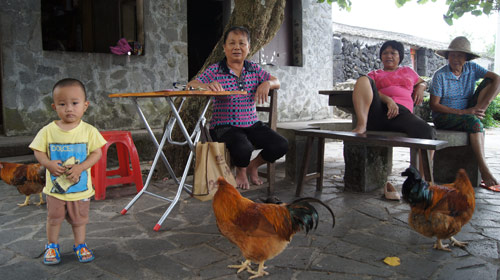Happy villages
 |
|
Villagers take a break in Meishe, once a poverty-stricken community that has become a hot tourist destination in Haikou, Hainan province. Photos by Huang Yiming / China Daily |
Hainan's provincial capital has transformed itself in the past two decades, Wang Ru reports in Haikou, and the villages of Meishe and Xinghui are shining examples of this change.
The transformation of two poor villages, one by dormant volcanoes and the other near a mangrove forest, bears witness to the changes in Haikou, Hainan's provincial capital.
Every morning, Wang Jianping walks along the main path of his 800-year-old village, paved with basalt from the volcanoes. Alongside the path are areca trees and new houses, which Wang proudly shows off to tourists.
There is a 20-meter-tall guard tower built at the beginning of the 20th century and giant basalt boulders with bullet holes from the War of Resistance against Japanese Aggression (1937-45).
As the head of Meishe village, in Xiuying district of Haikou, Wang, 47, is in charge of 800 people.
The nearby Leiqiong volcanic cluster, from the Quaternary period, consists of 40 volcanoes that are now a national geological park.
In addition to Meishe, there are 13 other nearby villages that have benefited from the selenium rich soil, which makes it a paradise for growing papaya, lychee and huanghuali, a rare species of rosewood.
In recent years, the price of the rare wood, used for furniture since the Ming Dynasty (1368-1644), has skyrocketed to about 20,000 yuan ($3,200) for 0.5 kg.
But just two decades ago, Meishe was poor and lacked basic resources like clean water, electricity and gas.
For generations, villagers used the black basalt to build houses and pigsties and chopped down the forest for fuel to keep warm and cook.
"In the past, we cut down all the wood in the mountains for firewood," Wang admits.
Among the harmful environmental effects of this deforestation were frequent landslides.
"Waste and garbage were everywhere. Life was a disaster then," Wang recalls.
Even water was a precious resource in this tropical paradise, as vats collected rainfall that drained off roofs.
"There was a tradition that families with the most water vats secured the best marriages," Wang says.
Wang Chunrong, a member of the village's Party Committee, adds: "Due to the horrible sanitation many women suffered from gynecological diseases and most families were too poor to afford medicines."
Since Hainan province was established in 1988 as a special economic zone, many young Meishe villagers migrated to the cities to study or work. They returned with money and the knowledge to rebuild their hometown.
Since the late 1990s, the local government provided finance to improve infrastructure, including building a highway to Haikou, repaving the roads and streets in the villages and building facilities like theaters, sports venues and village squares.
In 2002, tap water and electricity became available in Meishe, while the local government introduced farming tourism to help locals increase their incomes.
"We have always had wonderful volcanic scenery and tropical forests, but only in recent years have we realized they are a precious gift and we must make use of them to improve the lives of local people," says Liao Xiaoping, a media official in Haikou.
















